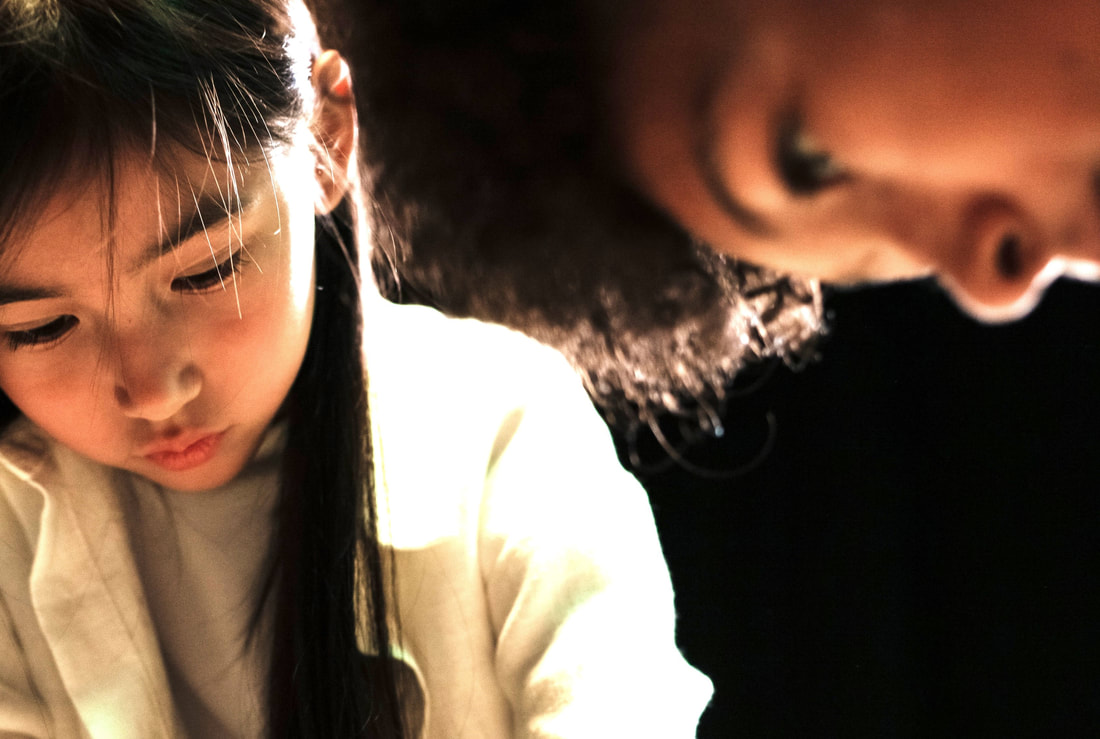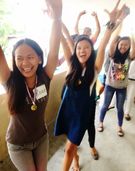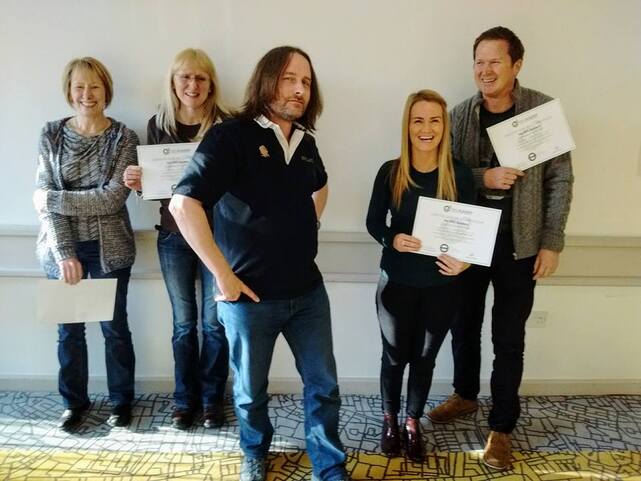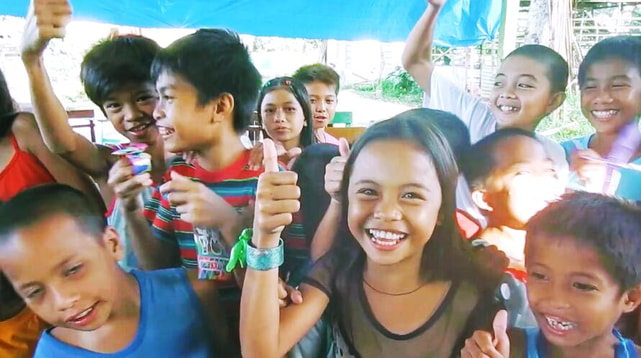|
‘The art of teaching is the art of assisting discovery.’ (Mark Van Doren) This looks and feels so very different to my own school days. It has been fascinating to explore the spirit and approach to working with students at a Montessori school in Germany over the past few weeks. Laura, an English language teacher from Romania, sets out a creative range of different activities in a classroom. The children look around and choose whichever activity appeals most to them. Every activity involves doing something physical, not just thinking. I’m struck by how the teacher chooses to offer only minimal explanation. Each student works at their own level and pace and problem-solves for themselves, or with others, if they get stuck. The teacher is available – if needed. Kathrin, a maths teacher, invites the students to sit in a circle and introduces me, briefly. She invites the students to practise English by asking me questions directly, questions to which the answer must be a number. They ask, ‘How tall are you?’, ‘How much do you weigh?’, ‘What’s your shoe size?’, ‘What did your trainers cost?’ etc. We notice that the measures I use in the UK are different to those they use in Germany. This sparks curiosity and the students work out how to convert the numbers I give them into those that are meaningful for them. The teacher writes each number on a large sheet of paper, then uses those numbers as the basis for introducing a maths method for that day. Melina, also an English language teacher, from Mexico, works with those students who find learning difficult. She uses a creative range of short, energetic, and fast-paced techniques that capture and hold their attention. Again, I’m struck by the use of physicality in the activities she facilitates. She adopts an evocative elicitation-based stance, stimulating the students to lead the activities, to play an active role and to work out the answers for themselves. (I noticed my own temptation to step in if they got stuck and, paradoxically, how often they didn’t need my help – if I simply allowed them time and space to resolve their own challenges). I'm a student among students and I feel inspired.
12 Comments
‘A skilful, patient process of walking people to their own conclusions.’ (David Brooks)
I liked Claire Pedrick’s definition of coaching from David Brooks (above). It resonates well with Henrick Adams’ citation from Alexandra Trenfor on teaching: ‘The best teachers are those who show you where to look but don’t tell you what to see.’ That, in turn, reminds me of Tony Jeffs and Mark Smiths’ quotation from Bill Rosseter on the goal of education: ‘It’s about moving on in some way from point A, not necessarily to point B or C, but to some position beyond A.’ Madge and Tom Batten, community development pioneers, coined the phrase ‘the non-directive approach’. Some years ago, I had the privilege of learning non-directive group facilitation alongside Catherine Widdicombe, author of Meetings that Work, co-leader of AVEC (‘with’) and a keen disciple of the Battens in this area. I use the word alongside deliberately because Catherine insisted on working-with, enabling and facilitating as the optimal route to developing my – and others’ – confidence, insights and skills. Her expertise lay in drawing out, encouraging experimentation and eliciting discovery rather than simply imparting her own acquired knowledge to passive recipients. In later years, I trained in non-directive supervision and coaching, both of which reflect a process of working with an individual or team developmentally, often enabling and enhancing critical reflexivity and critical reflective practice. Subsequently, I trained in action learning, a form of peer-coaching in groups that draws on the same fundamental ethos and principles: an opportunity to pose and receive Socratic-type questions that enable a person to move on – with greater depth or breadth – in her or his thinking and practice. It’s as much about growing in wisdom as reaching solutions. I often see Jesus using this approach in the gospels of the New Testament: evoking, provoking, revealing and releasing. I also see sports coaches, inspired by Timothy Gallwey’s The Inner Game, using it to great effect. When have you used a non-directive approach? How did you do it in practice? What impact did it have? Performance = Potential – Interference (Gallwey); Trust = Risk + Support (Covey).
‘Vocabulary, grammar, pronunciation’. If you’ve ever taught or learnt a foreign language, these words will sound very familiar to you. We could think of them as technical dimensions. They have an almost objective feel. The students I worked with in the Philippines last week have been taught well in English yet some still lacked confidence to use it. They were, at first, also unsure about how to navigate conversations with a person from the UK. We could call these psychological and cultural dimensions. Some were so preoccupied with doing it right that they struggled to do it at all. We opened the workshops by inviting the students to experiment with some simple ground rules: 1. Be willing to try. 2. It’s OK to make mistakes. 3. Support each other. 4. Any question is OK. Next, we introduced (playfully) that I would present a medal to every person who would come forward and speak at the front for the first time. I would not correct their English. I would simply reward their courage to do it. By the end of the first workshop, every student left proudly wearing a medal. By the end of the third workshop, every student took part enthusiastically in open group conversation. Taking a leaf from Timothy Gallwey’s research, we engaged the students in distractor topics (e.g. ‘Skin whitening in Asia’). The idea was to choose themes that the students would find interesting, provocative and meaningful. By focusing on the topic rather than on the language itself, the students became less self-conscious about their English and actually more fluent. In Gallwey’s terms, too much attention to performance can become an interference to performance. An overall approach? Open, relational warmth and positive reinforcement throughout: ‘What did well; Even better if.’ Now – a question: what are the lessons here for leadership, mentoring and coaching? A ‘university for the poor’. The past 2 weeks have been an inspiring and humbling experience at so many different levels. A close friend invited me to train and facilitate students, faculty and staff at a college in the Philippines that supports young people who cannot afford university education. It’s based in the inner city, shares basic facilities with various other government institutions and backs onto a market that, at times, fills hot and humid classrooms with a foul stench of waste. It’s my third time in the Philippines and I’m always struck by the wild, extroverted and, in some ways, quite crazy culture. Dance, song and loud music are everywhere (as are people with guns), intermingled with sounds of all kinds of passing traffic and street dogs barking. The students here greet me with wide-eyed enthusiasm. It’s unusual to receive a visitor from the UK and they are curious, intrigued and keen to learn. We run classes for 3 days and the energy in the group is exhilarating. At the end of the week, the students first sing a song to me then, one-by-one, come forward with hand written letters and cards, beautifully coloured and designed. I want to cry and yet fight back the tears. They are thanking me but I owe them so much. We move to workshops with faculty and staff using positive psychology and appreciative inquiry. Like the students before them, they are passionate, playful and professional. We laugh, work, sing, dance and learn together. These memories stay with me: Their faith in Jesus that shines simply and brightly without inhibition. Their vision for the poor that extends beyond academic theory to personal and social transformation. Their kind welcome and hospitality to me as a total stranger. The very special friend who worked so incredibly hard – yet so carefully avoided the limelight. The open-hearted generosity of students who said, ‘We want others to experience what we have experienced here.’ I took part in an intensive Teaching English as a Foreign Language workshop at the weekend. It forms part of a longer course that leads to a TEFL qualification. The tutor, John Nelson, was inspiring and experienced as a teacher and offered great insights, ideas and challenge in a spirit of support. I noticed how valuable it felt to have a tutor, a mentor, a leader with us on our learning journey.
John wasn’t simply a detached expert who stood and pointed us in the right direction. He was committed to ensuring that we were able to grow and succeed in our work. He engaged with us – tuned into where we were, what mattered to us, what we could already do well, what we were struggling with or could improve – and helped moved us forward towards where we wanted to be. At one point, John role-modelled a teaching session by enabling us to use basic greetings in an alien foreign language from scratch. At another, he gave us very specific feedback. I discovered that I can explain complex concepts simply…and that I can improve my teaching by engaging participants creatively in conversation around a topic first. I have grown in awareness, ability and confidence. So what are some lessons here for leaders, trainers, facilitators, mentors and coaches? The points that stand out for me are: (a) intention – a commitment to helping others to grow; (b) relationship – working with others as people, not as objects to be done to; (c) expertise – crafting and using what we have to move others forward and (d) freedom – a willingness to experiment, laugh and play! As we walked through the village we were met by wide smiles and eyes full of vivid curiosity. Brightly-coloured clothing hung outside of wooden huts to dry in the sun. Rice and coconut lay on the ground, apparently there to dry too. We had travelled by plane, ship, tuk tuk and boat, meandering through lush green jungle and rice fields to reach this place in Samar, Philippines. The children were excited having waited 3 hours for us to arrive. A rich sense of anticipation felt tangible in the air.
This was my first experience of working with such a large group of children. 120+ turned up, ages ranging from 3 to 12. We were there 2 weeks ago to inspire the children with English language, lead play activities, share about Jesus and provide nutritious food. The children were eager to learn, to spend time with this strange, tall, white alien and his inspiring, energetic Filipina counterpart – and to have fun. I don’t think I’ve ever encountered such wild, sustained enthusiasm in a group. We chose a theme each day and, at the start, invited the children to teach me some Waray, their local language. The teacher became learner and the students became teachers. The kids loved it, scoring my pronunciation by signalling thumbs up if I did well, thumbs sideways if I needed to improve, thumbs down if I was unintelligible! After each phrase the children jumped up and down with excitement, big smiles and waving their thumbs in the air. A true spirit of encouragement. This simple idea and approach gave the children real confidence to play and to practise with English language. They had seen my vulnerability, willingness to try, imperfect attempts and friendly laughter. It enabled them to give every activity we tried their best shot, encouraging each other when we-they did well and forgiving each other when we-they didn’t. We were committed to learn together, to travel an exciting journey of discovery together, and that made such a difference. |
Nick WrightI'm a psychological coach, trainer and OD consultant. Curious to discover how can I help you? Get in touch! Like what you read? Simply enter your email address below to receive regular blog updates!
|








 RSS Feed
RSS Feed